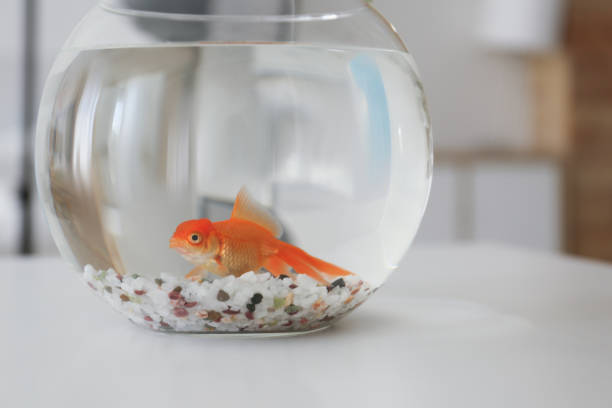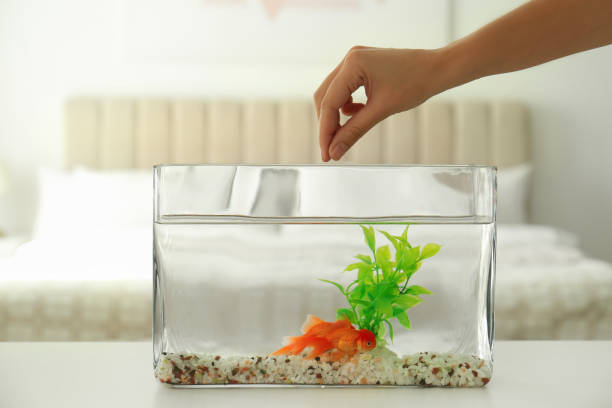Introduction
Goldfish not eating can be a major concern for any dedicated aquarist. When you notice your goldfish refusing food, it can signal potential health issues or environmental stressors. It’s essential to understand why your goldfish may stop eating and how to address the issue promptly. At The Goldfish Tank, we aim to provide you with comprehensive insights into goldfish care. Understanding the factors that lead to goldfish not eating will help you create a healthier and happier environment for your aquatic pets. Several reasons can contribute to this behavior, including changes in diet, water quality, stress, or underlying health problems.
To start, consider the dietary habits of your goldfish. Goldfish are omnivores and enjoy a variety of foods such as flakes, shrimp, spirulina, and even spinach. An unbalanced diet can lead to them rejecting their meals. Additionally, the quality of water in the aquarium plays a vital role. Poor water conditions can make your goldfish lethargic and disinterested in food. Another critical aspect is the stress caused by a new environment. Goldfish may stop eating after being moved to a new tank due to the stress of the transition. Finally, it’s essential to monitor for any signs of illness, as health problems can also lead to a goldfish not eating.
By understanding these factors, you can make the necessary adjustments and help your goldfish thrive once again. Stay tuned for more detailed strategies on how to encourage your goldfish to start eating and maintain their well-being.

Common Reasons Why Goldfish Stop Eating
Understanding the reasons behind goldfish not eating is essential for maintaining their health and well-being. Goldfish can stop eating for various reasons, and identifying the root cause is the first step to helping them.
1. Stress from Moving to a New Tank
One of the most common reasons for goldfish not eating is stress due to moving to a new tank. Goldfish are sensitive to changes in their environment, and a sudden move can cause stress, leading to a loss of appetite.
2. Poor Water Quality
Water quality is crucial for the health of goldfish. High levels of ammonia, nitrites, or nitrates can be harmful and lead to goldfish stopping eating. Regularly testing and maintaining clean water is vital to prevent this issue.
3. Illness and Health Problems
Illnesses and health problems can also result in your goldfish not eating. Common symptoms include lethargy, abnormal swimming patterns, and discoloration. Consulting a veterinarian who specializes in aquatic animals can help address these health concerns.
4. Inappropriate Diet
Feeding your goldfish an inappropriate diet can lead to a lack of interest in food. Goldfish require a balanced diet that includes proteins, vitamins, and plant-based components such as spirulina or spinach. Offering a variety of foods like flakes, pellets, freeze-dried shrimp, and blanched vegetables can make feeding time more appealing. Read more.
5. Obstructions and Physical Issues
Physical obstructions in the mouth or throat can also cause a goldfish to stop eating. Such obstructions can be due to ingesting large or sharp objects that hinder the goldfish’s ability to consume food comfortably. By understanding these common reasons why goldfish stop eating, you can take appropriate measures to ensure your pet’s health and happiness. Regular tank maintenance, a balanced diet, and a stress-free environment are key to addressing and preventing issues related to goldfish not eating.

Stress from Moving to a New Tank
Stress is a major reason why a goldfish might not be eating after being moved to a new tank. When goldfish experience stress from environmental changes, their behavior, including feeding habits, can be significantly impacted. Moving to a new aquarium can cause a lot of anxiety for goldfish. The change in surroundings, different tankmates, and new water parameters can all contribute to their stress levels. Goldfish are sensitive to changes in their environment, and this sensitivity often translates to a lack of interest in food.
The process of acclimating to a new tank involves major physiological adjustments for your goldfish. Factors like water temperature, pH levels, and water quality differ from the conditions in their previous tank. These variations can cause your goldfish to feel unsettled, making them less likely to eat. To help your goldfish adjust to the new environment and to encourage eating again, consider performing a gradual acclimation process. This minimizes the shock they experience when moving to the new tank. Also, try to maintain consistent water parameters to create a stable environment conducive to their well-being.
Additionally, avoid overpopulating the new tank with too many tankmates, as competition for resources can increase stress. Introducing hiding spots and plants can also help by giving your goldfish a place to retreat and feel secure. By understanding and addressing the stress factors related to moving to a new tank, you can facilitate a smoother transition for your goldfish and increase the likelihood of them resuming their normal eating patterns.
Water Quality Issues
One common reason for goldfish not eating is poor water quality in their aquarium. Goldfish are sensitive to changes in water parameters, and even slight imbalances can lead to stress or illness. When a goldfish is stressed due to water quality issues, it may stop eating as a result. Poor water quality can manifest in several ways, such as high levels of ammonia, nitrites, or nitrates. Ammonia poisoning is particularly dangerous and can occur in overstocked tanks or tanks with inadequate filtration. To prevent goldfish from not eating due to water quality issues, it is crucial to maintain a regular tank maintenance routine.
This includes performing partial water changes, monitoring water parameters, and ensuring the filtration system is working efficiently. Using a good-quality water testing kit can help identify potential problems before they cause harm to your goldfish. Additionally, avoid overfeeding, as uneaten food can decay and negatively impact water quality. By addressing water quality issues promptly, you can create a healthier environment, encouraging your goldfish to start eating again.

Illness and Health Problems
Goldfish not eating can often be a sign of illness or other health problems. Monitoring your goldfish for symptoms like lethargy, unusual swimming patterns, or visible marks on their body can help identify potential issues. Common goldfish illnesses include ich, swim bladder disease, and fungal infections, all of which can cause a decrease in appetite.
Swim bladder disease can make it difficult for your goldfish to swim properly and reach the surface to feed. Parasites are another common culprit behind a goldfish not eating. These parasites can cause discomfort or even blockages in the digestive tract, leading to a lack of interest in food. If you suspect your goldfish is unwell, separating them from other tankmates and consulting a vet specializing in aquatic animals can be critical steps.
Always ensure your goldfish receive a balanced diet rich in vitamins and nutrients to help maintain their health. Adding liquid vitamins or treating food with vitamin supplements can also aid in recovering from minor health issues.
Inappropriate Diet
An inappropriate diet can be a significant reason for goldfish not eating. Goldfish have specific dietary needs that must be met to ensure their health and vitality. If these needs aren’t met, they may reject their food. Goldfish require a varied diet that includes proteins, vitamins, and plant-based foods. Flake food alone is not sufficient; incorporating freeze-dried or frozen foods like shrimp can provide additional protein. Spirulina and blanched spinach offer essential vitamins and should be part of their diet.
Feeding goldfish a single type of food can lead to nutritional deficiencies and boredom. They might become lethargic and show less interest in eating. It’s crucial to vary their diet to keep them interested and healthy. Adding crisps, pellets, and fresh vegetables can make a significant difference. Checking the brand of food is also important. Some brands might not meet the nutritional needs of your goldfish. Always opt for high-quality brands that are known for balanced nutrition. Experimenting with different types of goldfish food can help in determining what they prefer.
Make sure food is appropriately sized to fit easily into their mouths. If the food is too large, goldfish might find it difficult to eat, leading to rejection. If food floats on the water surface for too long, it can lose its taste, making it unappetizing for your goldfish. By addressing these dietary issues, you can help encourage your goldfish to start eating again. Understanding their dietary needs and preferences is key to preventing feeding issues and ensuring their overall well-being.

How to Encourage Your Goldfish to Eat Again
If your goldfish is not eating, it can be a sign of underlying issues that need to be addressed promptly. Here at The Goldfish Tank, we understand the importance of ensuring your goldfish are happy and healthy. Let’s explore some effective strategies to encourage your goldfish to eat again.
Improving Water Quality
Goldfish are sensitive to water quality, and poor conditions can lead to a lack of appetite. Test your aquarium water regularly to monitor levels of ammonia, nitrites, and nitrates. Perform partial water changes frequently to keep the water clean and fresh.
Ensure your tank has an efficient filtration system to remove waste and toxins.
Offering a Variety of Foods
Goldfish can become bored with their diet, so providing a variety of food options can stimulate their appetite. Try offering different types of food such as flakes, pellets, freeze-dried shrimp, and plant-based foods like spirulina or blanched spinach. Adding high-protein foods like freeze-dried shrimp or bloodworms can also be beneficial. Experiment with different textures and tastes to see what your goldfish prefers.
Checking for Illness
Goldfish not eating can often be a symptom of illness or health problems. Look for signs such as lethargy, abnormal swimming, or visible lesions. Consult with a veterinarian who specializes in aquatic animals if you suspect your goldfish might be sick. Early detection and treatment of illnesses can help restore their appetite.
Reducing Stress
Stress from various factors like moving to a new tank, poor water quality, or aggressive tankmates can cause your goldfish to stop eating. Ensure the tank environment is calm and stable. Avoid sudden changes in water temperature or PH. If necessary, provide hiding spots or consider rehoming aggressive tankmates to reduce stress.

Treating for Parasites or Obstructions
Internal parasites or physical obstructions in the mouth or throat can prevent your goldfish from eating. Observe if your goldfish is trying to eat but spitting out food frequently. Use appropriate treatments for parasites as recommended by a professional. If an obstruction is suspected, consult with a veterinarian for safe removal techniques.
By addressing these common issues, you can encourage your goldfish to start eating again and ensure they thrive in a healthy aquarium environment. Adjusting their diet, improving water quality, and reducing stress levels are key steps to reviving their appetite. Remember to monitor your goldfish closely and seek professional advice when necessary.

Conclusion
Addressing the issue of goldfish not eating can be challenging, but it’s crucial for the health of your aquatic pets. By identifying the root causes such as water quality, stress, illness, and diet, you can take the necessary steps to alleviate the problem. Improving water quality is a fundamental step in making sure your goldfish are in optimal health. Additionally, offering a variety of foods can help in enticing your goldfish to eat again. Checking for signs of illness and taking appropriate measures can significantly impact your goldfish’s appetite.
Lastly, reducing stress in the tank environment will make your goldfish more comfortable, increasing the likelihood that they will start eating again. Keep these points in mind, and you’ll be well-equipped to handle the issue of goldfish not eating with confidence.
